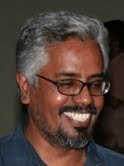malayalee male heroism
Male Heroism and Family at the Verge
Interestingly, the narrative centre of two recent films, Thanmatra (Blessey) and Achanurangatha Veedu (Lal Jose), is the middle class malayalee family. In both films an accident or an unexpected turn of events swirl the otherwise complacent and well-knit family out of control and into deep chaos. Families in both the films are patriarchal, with a 'proper' man at the head as the sole earning member; it may not be a coincidence that both are also middle level government employees. While the mother is a housewife in Thanmatra, in Achanurangatha Veedu, she is only a memory, someone who has left behind three girl children to the care of the father. The coincidences do not end there. In both films, the fathers have placed great hopes upon the future careers of their children; both ultimate Malayalee dreams, of making their offspring a doctor and an IAS officer. While the dream is shattered in the case of the daughter in Achanurangatha Veedu, it is a near-possibility in Thanmatra. In both cases, dreams are displaced onto the next generation; unlived lives and unrealized dreams haunt both the families, or more exactly, the patriarch-fathers. Significantly, the family in the former film is a dalit Christian one (converted one), and in the latter a middle caste.
The tragic end that the Idea of the middle class family meets with in both films, hints at the wider and deeper social despair in our society. The solitary unit of the middle class family, (the word 'nuclear' gains ominous resonance in this context) plunges into a dark despair in both instances; and it is not able to reach out to or connect to anything social or humane, from which it could draw some sense, of meaning and sustenance. The frenzy of the community prayers of his adopted religion on the one side and the occultism of the community that he left on the other side, in Achanurangatha veedu, is a stark and chilling reminder of the very impossibility of community in the real sense. It seems to be something that can be felt or reached only in a frenzied state, something that one has to furiously work up; curiously, it is a space where one is one with the transcendental but utterly alone socially or physically. Look at the shots of the frenzied prayers, where each one desperately tries to 'get lost' in oneself or dissolve oneself to reach the ecstatic state of togetherness with the divine. In the case of the hero of Thanmatra, it is through memory and memorizing that he tries to keep the world around him and his sense of identity and self-respect together. Once he loses that faculty, the world crumbles around him like a pack of cards.
To say that the withdrawal of the individual into the shell of nuclear units reflects and amplifies the inhumanity of the System itself would be a cliche. May be it is more significant that in both the films, it is basically the loneliness and despair of the man, the patriarch, the 'head of the family' that constitutes its essential tragedy says a lot about malayalee modernity and post-modernity. More significantly, though both of them are men and patriarchs, their journeys have been radically different. For the hero of Achanurangatha Veedu it is a journey from the idiotic occultism to frenzied prayers and utter lack of hope, for he is totally devoid of any dreams at the end; for the middle class/caste hero of Thanmatra it is a long journey of displaced/postponed dreams, which at the end, when it approaches realization, finds he himself as dead vegetable. Another interesting feature of both films is the lack of or cancellation of heroism. While the hero figure in Thanmatra is systematically stripped of any kind of heroism, the similar is the case with Achanurangatha Veedu, where even the potential heroes (like the wronged youth played by Prithviraj or the upright police inspector) fail the conventional narrative demands. Despite all the shortcomings, this total absence of male heroism and the impossibility of man-woman relationship/romance in the background of an impotent and indifferent System, bring these narratives especially of the latter to the verge of something radical.


0 Comments:
Post a Comment
Subscribe to Post Comments [Atom]
<< Home